The Cambridge History of China. Vol. 12: Republican China, 1912-1949, Part 1
Подождите немного. Документ загружается.

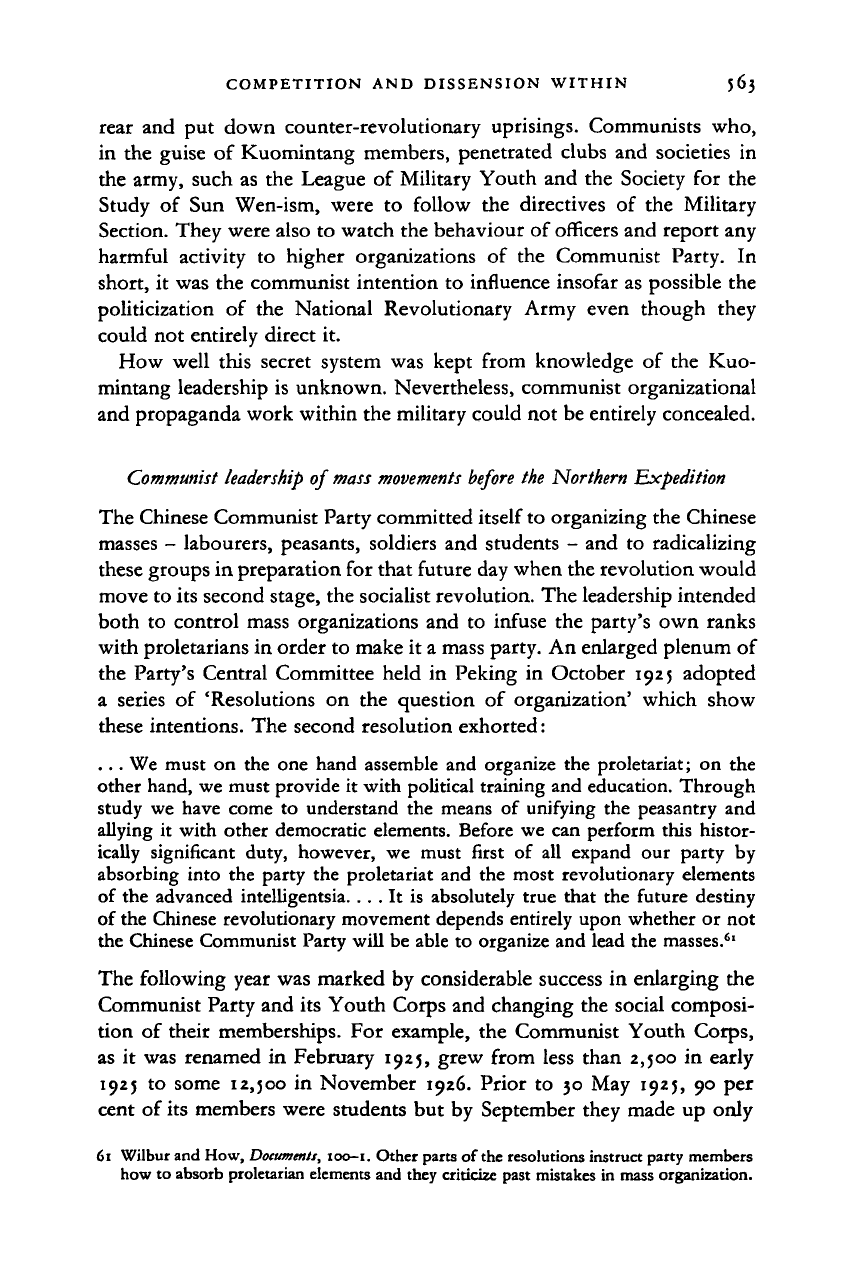
COMPETITION AND DISSENSION WITHIN 563
rear and put down counter-revolutionary uprisings. Communists who,
in the guise of Kuomintang members, penetrated clubs and societies in
the army, such as the League of Military Youth and the Society for the
Study of Sun Wen-ism, were to follow the directives of the Military
Section. They were also to watch the behaviour of officers and report any
harmful activity to higher organizations of the Communist Party. In
short, it was the communist intention to influence insofar as possible the
politicization of the National Revolutionary Army even though they
could not entirely direct it.
How well this secret system was kept from knowledge of the Kuo-
mintang leadership is unknown. Nevertheless, communist organizational
and propaganda work within the military could not be entirely concealed.
Communist
leadership
of
mass movements before
the Northern Expedition
The Chinese Communist Party committed itself to organizing the Chinese
masses - labourers, peasants, soldiers and students - and to radicalizing
these groups in preparation for that future day when the revolution would
move to its second stage, the socialist revolution. The leadership intended
both to control mass organizations and to infuse the party's own ranks
with proletarians in order to make it a mass party. An enlarged plenum of
the Party's Central Committee held in Peking in October 1925 adopted
a series of 'Resolutions on the question of organization' which show
these intentions. The second resolution exhorted:
... We must on the one hand assemble and organize the proletariat; on the
other hand, we must provide it with political training and education. Through
study we have come to understand the means of unifying the peasantry and
allying it with other democratic elements. Before we can perform this histor-
ically significant duty, however, we must first of all expand our party by
absorbing into the party the proletariat and the most revolutionary elements
of the advanced intelligentsia. ... It is absolutely true that the future destiny
of the Chinese revolutionary movement depends entirely upon whether or not
the Chinese Communist Party will be able to organize and lead the masses.
6
'
The following year was marked by considerable success in enlarging the
Communist Party and its Youth Corps and changing the social composi-
tion of their memberships. For example, the Communist Youth Corps,
as it was renamed in February 1925, grew from less than 2,500 in early
1925 to some 12,500 in November 1926. Prior to 30 May 1925, 90 per
cent of its members were students but by September they made up only
61 Wilbur and How,
Documents,
IOO-I.
Other parts of the resolutions instruct party members
how to absorb proletarian elements and they criticize past mistakes in mass organization.
Cambridge Histories Online © Cambridge University Press, 2008
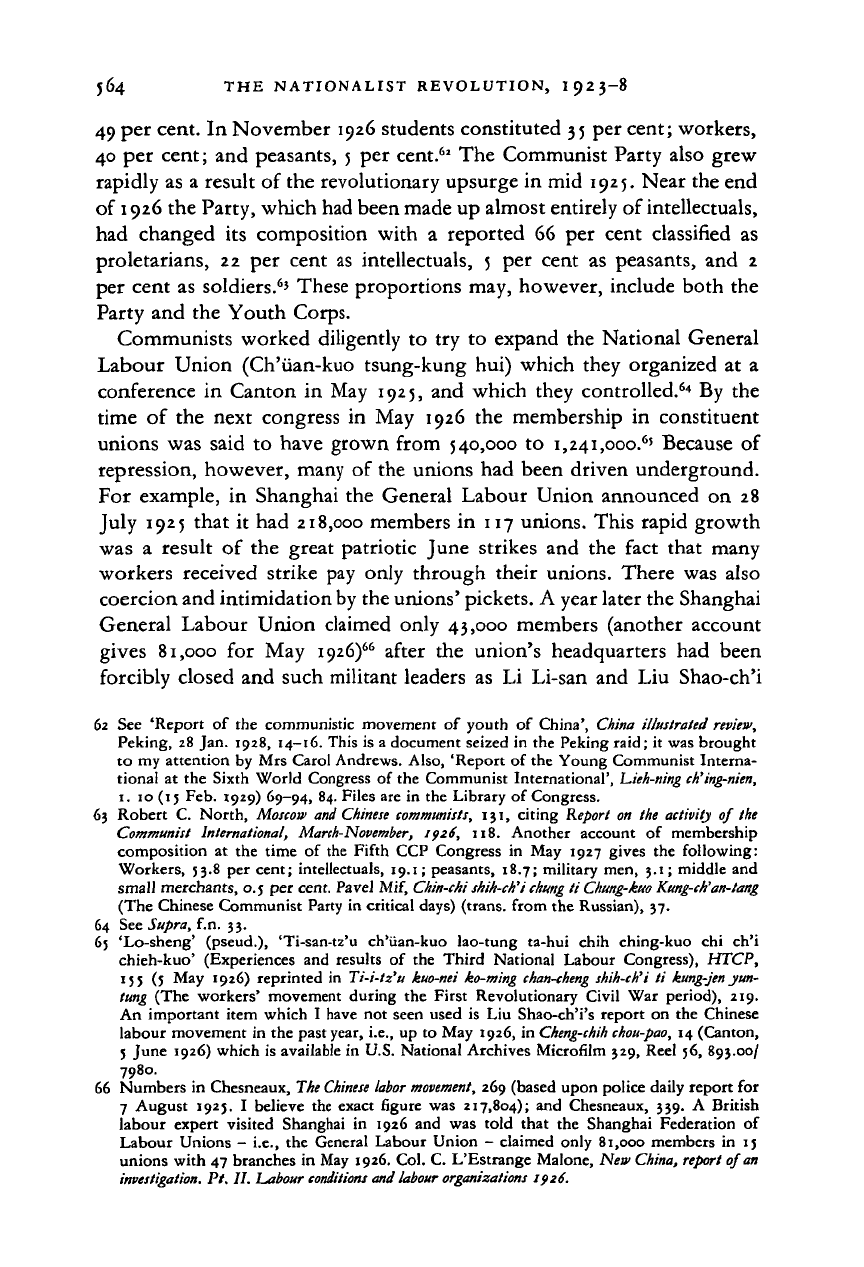
564 THE NATIONALIST REVOLUTION,
1
9
2
3-8
49
per
cent.
In
November 1926 students constituted 35
per
cent; workers,
40
per
cent;
and
peasants,
5
per
cent.
62
The
Communist Party also grew
rapidly
as a
result
of the
revolutionary upsurge
in mid
1925. Near
the end
of 1926
the
Party, which
had
been made
up
almost entirely
of
intellectuals,
had changed
its
composition with
a
reported
66 per
cent classified
as
proletarians,
22 per
cent
as
intellectuals,
5 per
cent
as
peasants,
and
2
per cent
as
soldiers.
6
' These proportions
may,
however, include both
the
Party
and the
Youth Corps.
Communists worked diligently
to
try
to
expand
the
National General
Labour Union (Ch'iian-kuo tsung-kung
hui)
which they organized
at a
conference
in
Canton
in
May 1925, and
which they controlled.
64
By the
time
of
the
next congress
in
May 1926
the
membership
in
constituent
unions
was
said
to
have grown from 540,000
to
1,241,000.'' Because
of
repression, however, many
of
the
unions
had
been driven underground.
For example,
in
Shanghai
the
General Labour Union announced
on 28
July
1925
that
it
had
218,000 members
in 117
unions. This rapid growth
was
a
result
of
the
great patriotic June strikes
and the
fact that many
workers received strike
pay
only through their unions. There
was
also
coercion
and
intimidation by
the
unions' pickets.
A
year later
the
Shanghai
General Labour Union claimed only 43,000 members (another account
gives 81,000
for
May
1926)
66
after
the
union's headquarters
had
been
forcibly closed
and
such militant leaders
as Li
Li-san
and Liu
Shao-ch'i
62
See
'Report
of
the
communistic movement
of
youth
of
China', China illustrated review,
Peking,
28 Jan. 1928,
14-16. This
is
a
document seized
in
the
Peking raid;
it
was
brought
to
my
attention
by Mrs
Carol Andrews. Also, 'Report
of
the
Young Communist Interna-
tional
at
the
Sixth World Congress
of
the
Communist International',
L.ieh-ning
ch'ing-nien,
1.
10 (15 Feb. 1929)
69-94,
84.
Files
are
in
the
Library
of
Congress.
63 Robert
C.
North, Moscow
and
Chinese
communists,
131,
citing Report
on the
activity
of
the
Communist International, March-November,
1926, 118.
Another account
of
membership
composition
at the
time
of
the Fifth CCP Congress
in May
1927 gives
the
following:
Workers, 53.8
per
cent; intellectuals, 19.1; peasants, 18.7; military men, 3.1; middle and
small merchants,
0.5 per
cent. Pavel
Mif,
Chin-chi shih-ch'i
chung
ti
Chung-kuo Kung-ch'an-tang
(The Chinese Communist Party
in
critical days) (trans, from the Russian),
37.
64 See Supra,
f.n. 33.
65 'Lo-sheng' (pseud.), 'Ti-san-tz'u ch'iian-kuo lao-tung ta-hui chih ching-kuo
chi ch'i
chieh-kuo' (Experiences
and
results
of the
Third National Labour Congress), HTCP,
'5
5
(5
May 1926)
reprinted
in
Ti-i-tz'u kuo-nei ko-ming
chan-cheng
shih-ch'i
ti
kung-jen
yun-
tung
(The
workers' movement during
the
First Revolutionary Civil
War
period),
219.
An important item which
I
have
not
seen used
is Liu
Shao-ch'i's report
on the
Chinese
labour movement
in
the past year, i.e.,
up to
May 1926,
in
Cheng-chih
chou-pao,
14 (Canton,
5 June 1926) which is available
in
U.S. National Archives Microfilm 329, Reel 56, 893.00/
7980.
66 Numbers
in
Chesneaux, The
Chinese labor
movement,
269 (based upon police daily report
for
7 August 1925.
I
believe
the
exact figure
was
217,804);
and
Chesneaux, 339.
A
British
labour expert visited Shanghai
in
1926
and was
told that
the
Shanghai Federation
of
Labour Unions
—
i.e.,
the
General Labour Union
—
claimed only 81,000 members
in 15
unions with 47 branches
in
May 1926. Col. C. L'Estrange Malone, New
China,
report
of
an
investigation.
Pt. II.
Labour
conditions
and
labour organizations
1926.
Cambridge Histories Online © Cambridge University Press, 2008
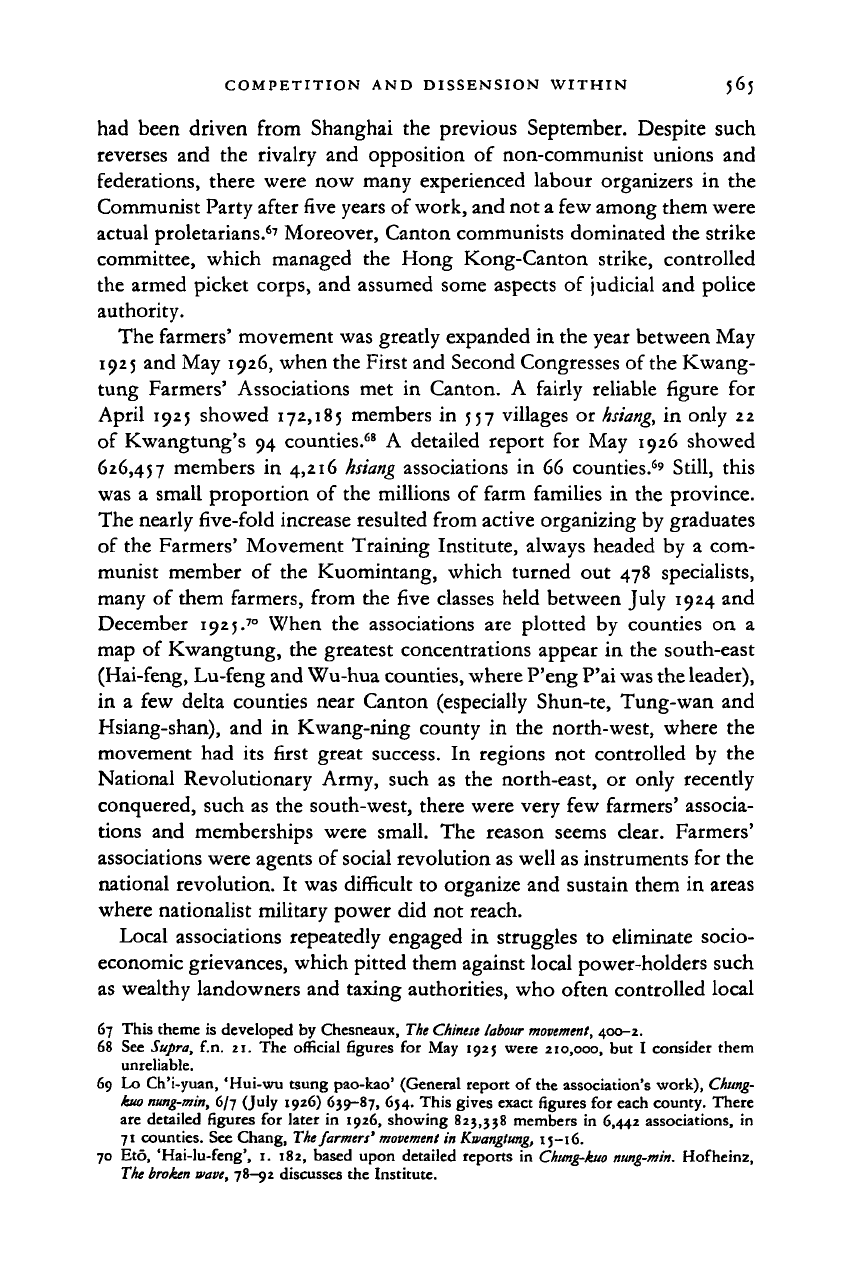
COMPETITION AND DISSENSION WITHIN 565
had been driven from Shanghai the previous September. Despite such
reverses and the rivalry and opposition of non-communist unions and
federations, there were now many experienced labour organizers in the
Communist Party after five years of work, and not a few among them were
actual proletarians.
6
' Moreover, Canton communists dominated the strike
committee, which managed the Hong Kong-Canton strike, controlled
the armed picket corps, and assumed some aspects of judicial and police
authority.
The farmers' movement was greatly expanded in the year between May
1925 and May 1926, when the First and Second Congresses of the Kwang-
tung Farmers' Associations met in Canton. A fairly reliable figure for
April 1925 showed 172,185 members in 557 villages or
hsiang,
in only 22
of Kwangtung's 94 counties.
68
A detailed report for May 1926 showed
626,457 members in 4,216
hsiang
associations in 66 counties.
6
' Still, this
was a small proportion of the millions of farm families in the province.
The nearly five-fold increase resulted from active organizing by graduates
of the Farmers' Movement Training Institute, always headed by a com-
munist member of the Kuomintang, which turned out 478 specialists,
many of them farmers, from the five classes held between July 1924 and
December 1925.
70
When the associations are plotted by counties on a
map of Kwangtung, the greatest concentrations appear in the south-east
(Hai-feng, Lu-feng and Wu-hua counties, where P'eng P'ai was the leader),
in a few delta counties near Canton (especially Shun-te, Tung-wan and
Hsiang-shan), and in Kwang-ning county in the north-west, where the
movement had its first great success. In regions not controlled by the
National Revolutionary Army, such as the north-east, or only recently
conquered, such as the south-west, there were very few farmers' associa-
tions and memberships were small. The reason seems clear. Farmers'
associations were agents of social revolution as well as instruments for the
national revolution. It was difficult to organize and sustain them in areas
where nationalist military power did not reach.
Local associations repeatedly engaged in struggles to eliminate socio-
economic grievances, which pitted them against local power-holders such
as wealthy landowners and taxing authorities, who often controlled local
67 This theme is developed by Chesneaux,
The Chinese labour
movement,
400-2.
68 See Supra, f.n. 21. The official figures for May 1925 were 210,000, but I consider them
unreliable.
69 Lo Ch'i-yuan, 'Hui-wu tsung pao-kao' (General report of the association's work),
Chung-
kuo
nung-min,
6/7 (July 1926) 639-87, 654. This gives exact figures for each county. There
are detailed figures for later in 1926, showing 823,338 members in 6,442 associations, in
71 counties. See Chang, The farmers'
movement
in
Kwangtung,
15-16.
70 Eto, 'Hai-lu-feng', 1. 182, based upon detailed reports in
Chung-kuo
nung-min.
Hofheinz,
The broken
wave,
78—92 discusses the Institute.
Cambridge Histories Online © Cambridge University Press, 2008
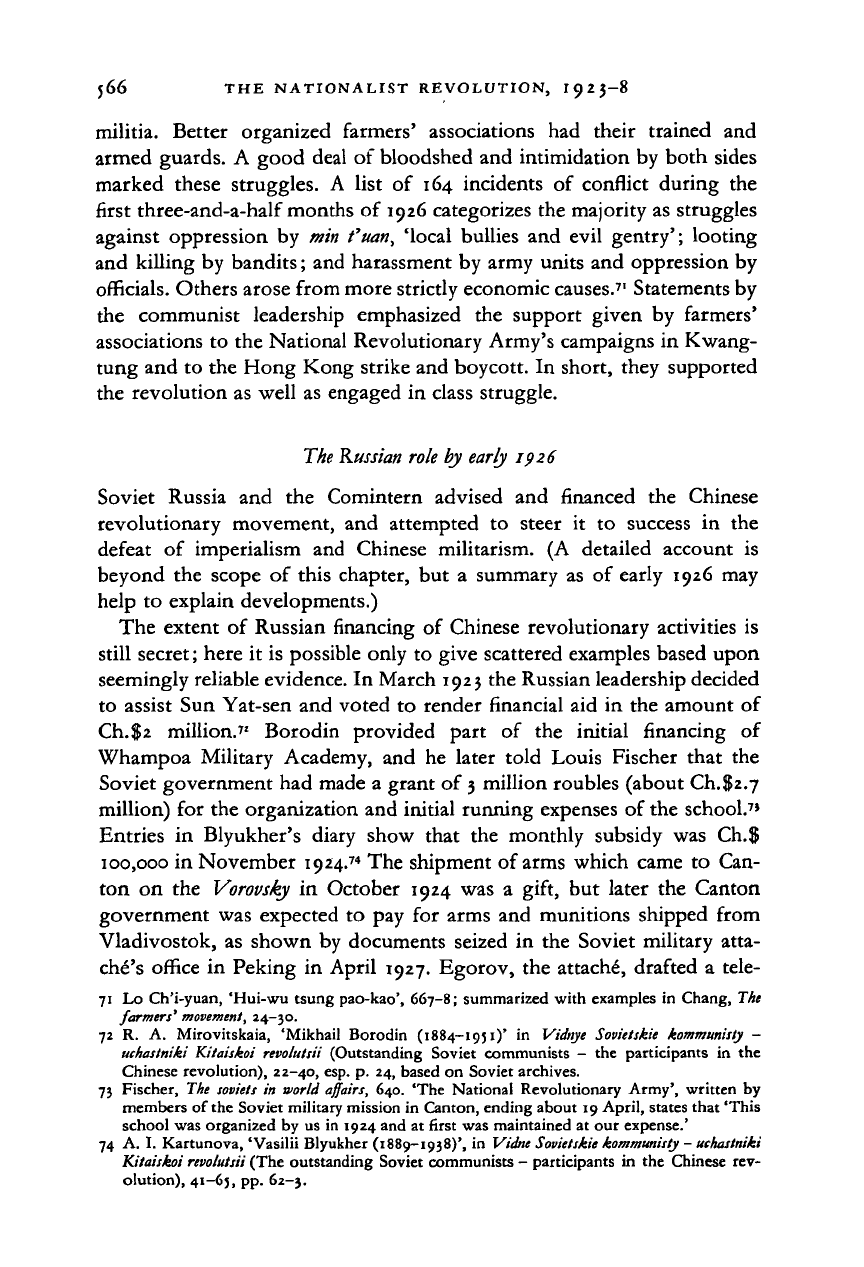
566 THE NATIONALIST REVOLUTION, 1923-8
militia. Better organized farmers' associations
had
their trained
and
armed guards.
A
good deal
of
bloodshed and intimidation by both sides
marked these struggles.
A
list
of
164 incidents
of
conflict during
the
first three-and-a-half months
of
1926 categorizes the majority as struggles
against oppression
by
min t'uan, 'local bullies and evil gentry'; looting
and killing by bandits; and harassment by army units and oppression by
officials. Others arose from more strictly economic causes.
7
' Statements by
the communist leadership emphasized
the
support given
by
farmers'
associations to the National Revolutionary Army's campaigns in Kwang-
tung and to the Hong Kong strike and boycott. In short, they supported
the revolution as well as engaged in class struggle.
The Russian role by early 1926
Soviet Russia
and the
Comintern advised
and
financed
the
Chinese
revolutionary movement,
and
attempted
to
steer
it to
success
in the
defeat
of
imperialism
and
Chinese militarism.
(A
detailed account
is
beyond the scope
of
this chapter, but
a
summary
as of
early 1926 may
help
to
explain developments.)
The extent
of
Russian financing
of
Chinese revolutionary activities
is
still secret; here
it
is possible only to give scattered examples based upon
seemingly reliable evidence. In March 192} the Russian leadership decided
to assist Sun Yat-sen and voted
to
render financial aid
in
the amount of
Ch.$2 million.
72
Borodin provided part
of the
initial financing
of
Whampoa Military Academy,
and he
later told Louis Fischer that
the
Soviet government had made
a
grant
of
3
million roubles (about Ch.$2.7
million) for the organization and initial running expenses of the school.
7
'
Entries
in
Blyukher's diary show that
the
monthly subsidy was Ch.$
100,000 in November 1924.
74
The shipment of arms which came
to
Can-
ton
on
the Vorovsky
in
October 1924 was
a
gift,
but
later the Canton
government was expected
to
pay
for
arms and munitions shipped from
Vladivostok,
as
shown by documents seized
in
the Soviet military atta-
che's office
in
Peking
in
April 1927. Egorov, the attache, drafted
a
tele-
71
Lo
Ch'i-yuan, 'Hui-wu tsung pao-kao', 667-8; summarized with examples
in
Chang, The
farmers'
movement,
24-30.
72
R. A.
Mirovitskaia, 'Mikhail Borodin (1884-1951)'
in
Vidnye Sovietskie kommunisty
-
uchastniki Kitaiskoi revolutsii (Outstanding Soviet communists
- the
participants
in the
Chinese revolution), 22-40, esp.
p.
24, based on Soviet archives.
73 Fischer, The
Soviets
in world
affairs,
640. 'The National Revolutionary Army', written
by
members of the Soviet military mission in Canton, ending about 19 April, states that 'This
school was organized by us in 1924 and at first was maintained at our expense.'
74
A. I.
Kartunova, 'Vasilii Blyukher (1889-1938)',
in
Vidne
Sovietskie kommunisty
-
uchastniki
Kitaiskoi
revolutsii
(The outstanding Soviet communists
-
participants
in the
Chinese rev-
olution), 41-65, pp. 62-3.
Cambridge Histories Online © Cambridge University Press, 2008
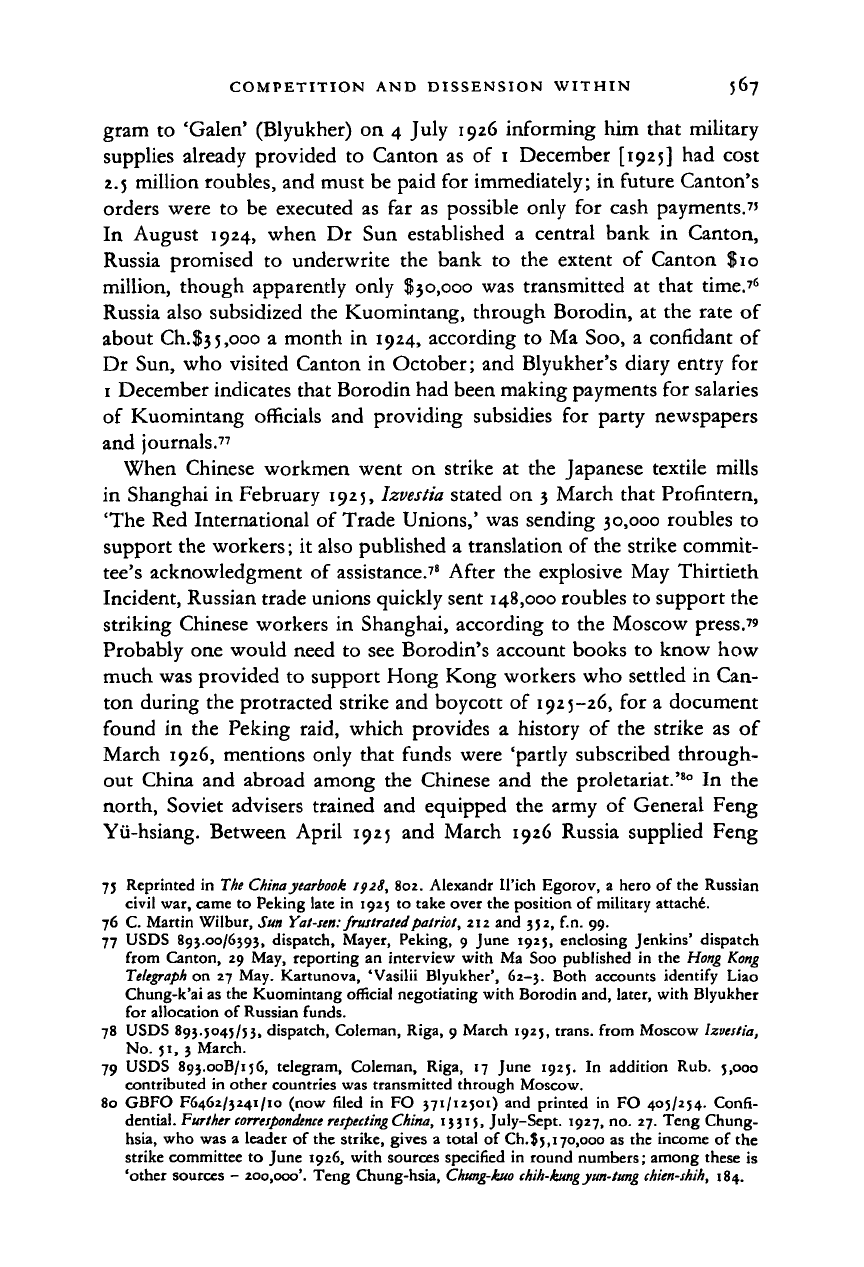
COMPETITION AND DISSENSION WITHIN 567
gram to 'Galen' (Blyukher) on 4 July 1926 informing him that military
supplies already provided to Canton as of 1 December [1925] had cost
2.5 million roubles, and must be paid for immediately; in future Canton's
orders were to be executed as far as possible only for cash payments.
75
In August 1924, when Dr Sun established a central bank in Canton,
Russia promised to underwrite the bank to the extent of Canton Sio
million, though apparently only $30,000 was transmitted at that time.'
6
Russia also subsidized the Kuomintang, through Borodin, at the rate of
about
Ch.$3
5,ooo
a month in 1924, according to Ma Soo, a confidant of
Dr Sun, who visited Canton in October; and Blyukher's diary entry for
1 December indicates that Borodin had been making payments for salaries
of Kuomintang officials and providing subsidies for party newspapers
and journals.
77
When Chinese workmen went on strike at the Japanese textile mills
in Shanghai in February 1925,
Izvestia
stated on 3 March that Profintern,
'The Red International of Trade Unions,' was sending 30,000 roubles to
support the workers; it also published a translation of the strike commit-
tee's acknowledgment of assistance.
78
After the explosive May Thirtieth
Incident, Russian trade unions quickly sent 148,000 roubles to support the
striking Chinese workers in Shanghai, according to the Moscow press.
79
Probably one would need to see Borodin's account books to know how
much was provided to support Hong Kong workers who settled in Can-
ton during the protracted strike and boycott of 1925-26, for a document
found in the Peking raid, which provides a history of the strike as of
March 1926, mentions only that funds were 'partly subscribed through-
out China and abroad among the Chinese and the proletariat.'
80
In the
north, Soviet advisers trained and equipped the army of General Feng
Yii-hsiang. Between April 1925 and March 1926 Russia supplied Feng
75 Reprinted in
The
China yearbook 192S, 802. Alexandr Il'ich Egorov, a hero of the Russian
civil war, came to Peking late in 1925 to take over the position of military attache.
76 C. Martin Wilbur, Sun Yat-sen: frustrated patriot, 212 and 352, f.n. 99.
77 USDS 893.00/6393, dispatch, Mayer, Peking, 9 June 1925, enclosing Jenkins' dispatch
from Canton, 29 May, reporting an interview with Ma Soo published in the Hong
Kong
Telegraph
on 27 May. Kartunova, 'Vasilii Blyukher', 62-3. Both accounts identify Liao
Chung-k'ai as the Kuomintang official negotiating with Borodin and, later, with Blyukher
for allocation of Russian funds.
78 USDS 893.5045/53, dispatch, Coleman, Riga, 9 March 1925, trans, from Moscow Izvestia,
No.
51, 3 March.
79 USDS 893.00B/156, telegram, Coleman, Riga, 17 June 1925. In addition Rub. 5,000
contributed in other countries was transmitted through Moscow.
80 GBFO F6462/3241/10 (now filed in FO 371/12501) and printed in FO 405/254. Confi-
dential.
Further correspondence respecting
China,
13315, July-Sept. 1927, no. 27. Teng Chung-
hsia, who was a leader of the strike, gives a total of Ch.$5,170,000 as the income of the
strike committee to June 1926, with sources specified in round numbers; among these is
'other sources - 200,000'. Teng Chung-hsia, Chung-bio chih-hmg yun-tung
chien-shih,
184.
Cambridge Histories Online © Cambridge University Press, 2008
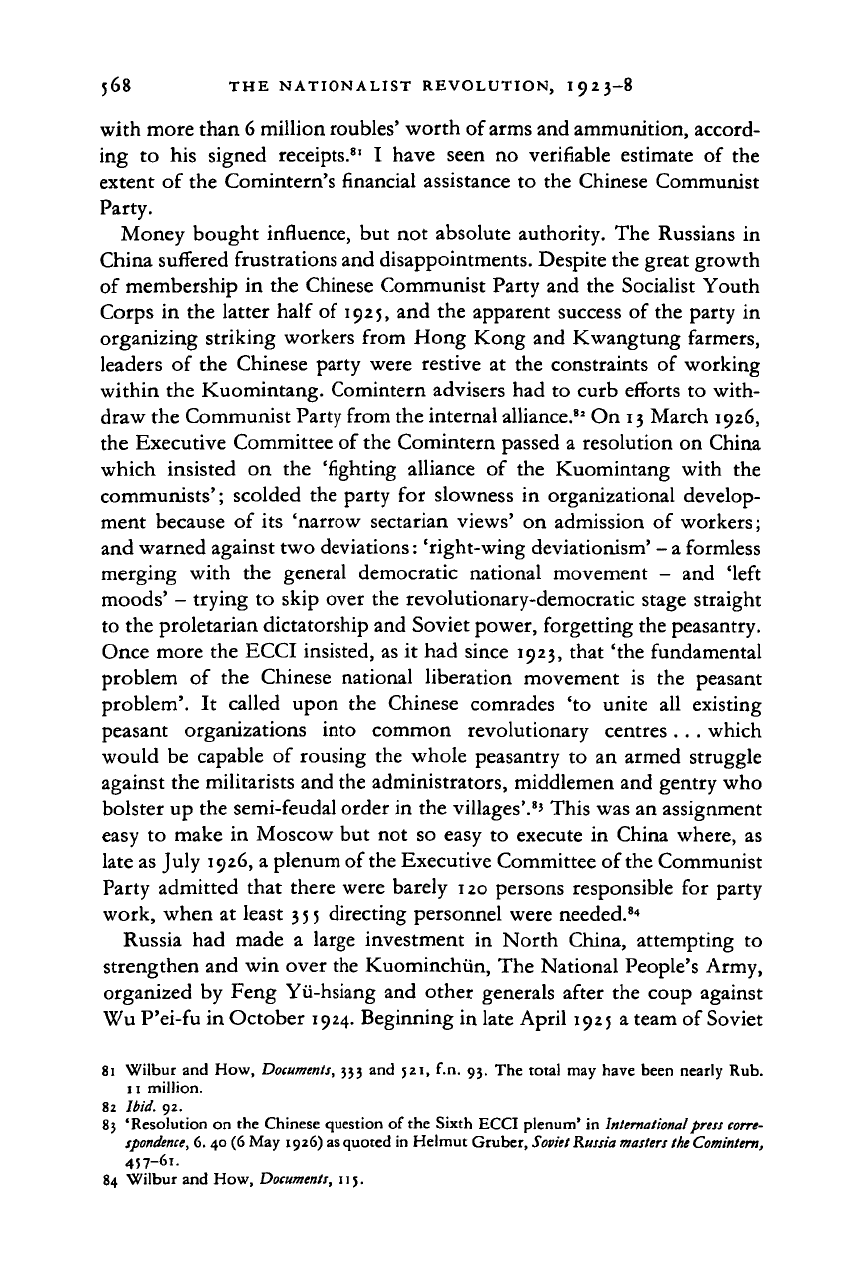
568 THE NATIONALIST REVOLUTION, I 9 2 3-8
with more than 6 million roubles' worth of
arms
and ammunition, accord-
ing to his signed receipts.
8
' I have seen no verifiable estimate of the
extent of the Comintern's financial assistance to the Chinese Communist
Party.
Money bought influence, but not absolute authority. The Russians in
China suffered frustrations and disappointments. Despite the great growth
of membership in the Chinese Communist Party and the Socialist Youth
Corps in the latter half of 1925, and the apparent success of the party in
organizing striking workers from Hong Kong and Kwangtung farmers,
leaders of the Chinese party were restive at the constraints of working
within the Kuomintang. Comintern advisers had to curb efforts to with-
draw the Communist Party from the internal alliance.
82
On
13
March 1926,
the Executive Committee of the Comintern passed a resolution on China
which insisted on the 'fighting alliance of the Kuomintang with the
communists'; scolded the party for slowness in organizational develop-
ment because of its 'narrow sectarian views' on admission of workers;
and warned against two deviations: 'right-wing deviationism' - a formless
merging with the general democratic national movement - and 'left
moods' - trying to skip over the revolutionary-democratic stage straight
to the proletarian dictatorship and Soviet power, forgetting the peasantry.
Once more the ECCI insisted, as it had since 1923, that 'the fundamental
problem of the Chinese national liberation movement is the peasant
problem'. It called upon the Chinese comrades 'to unite all existing
peasant organizations into common revolutionary centres . . . which
would be capable of rousing the whole peasantry to an armed struggle
against the militarists and the administrators, middlemen and gentry who
bolster up the semi-feudal order in the villages'.
8
' This was an assignment
easy to make in Moscow but not so easy to execute in China where, as
late as July 1926, a plenum of the Executive Committee of the Communist
Party admitted that there were barely 120 persons responsible for party
work, when at least
3 5 5
directing personnel were needed.
84
Russia had made a large investment in North China, attempting to
strengthen and win over the Kuominchun, The National People's Army,
organized by Feng Yii-hsiang and other generals after the coup against
Wu P'ei-fu in October 1924. Beginning in late April 1925a team of Soviet
81 Wilbur and How,
Documents,
353 and 521, f.n. 93. The total may have been nearly Rub.
11 million.
82 Ibid. 92.
83 'Resolution on the Chinese question of the Sixth ECCI plenum' in International press
corre-
spondence,
6. 40 (6 May 1926)
as
quoted in Helmut Gruber, Soviet Russia masters
the
Comintern,
457-61.
84 Wilbur
and How,
Documents,
115.
Cambridge Histories Online © Cambridge University Press, 2008
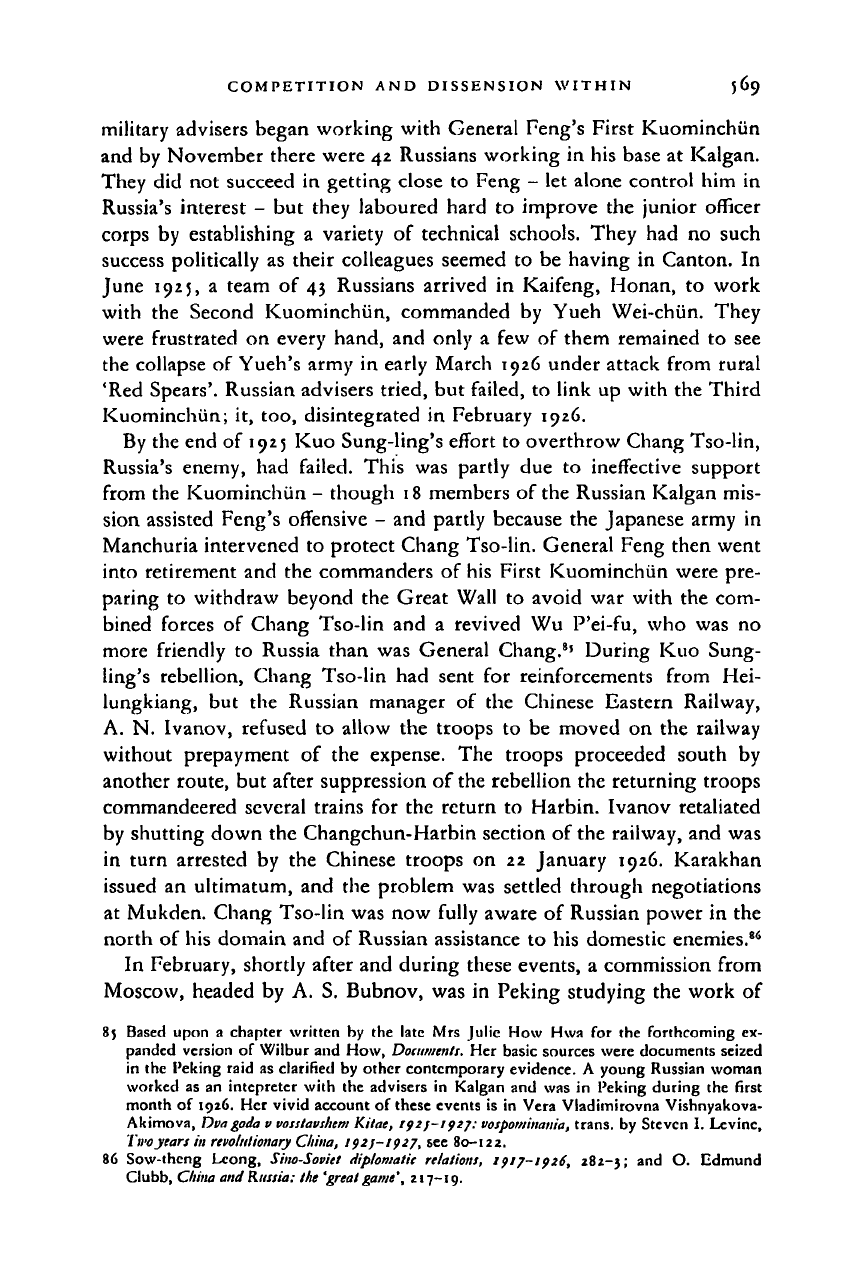
COMPETITION AND DISSENSION WITHIN 569
military advisers began working with General Feng's First Kuominchun
and by November there were 42 Russians working in his base at Kalgan.
They did not succeed in getting close to Feng - let alone control him in
Russia's interest - but they laboured hard to improve the junior officer
corps by establishing a variety of technical schools. They had no such
success politically as their colleagues seemed to be having in Canton. In
June 1925, a team of 43 Russians arrived in Kaifeng, Honan, to work
with the Second Kuominchun, commanded by Yueh Wei-chim. They
were frustrated on every hand, and only a few of them remained to see
the collapse of Yueh's army in early March 1926 under attack from rural
'Red Spears'. Russian advisers tried, but failed, to link up with the Third
Kuominchun; it, too, disintegrated in February 1926.
By the end of 1925 Kuo Sung-ling's effort to overthrow Chang Tso-lin,
Russia's enemy, had failed. This was partly due to ineffective support
from the Kuominchun - though 18 members of the Russian Kalgan mis-
sion assisted Feng's offensive - and partly because the Japanese army in
Manchuria intervened to protect Chang Tso-lin. General Feng then went
into retirement and the commanders of his First Kuominchun were pre-
paring to withdraw beyond the Great Wall to avoid war with the com-
bined forces of Chang Tso-lin and a revived Wu P'ei-fu, who was no
more friendly to Russia than was General Chang.
8
' During Kuo Sung-
ling's rebellion, Chang Tso-lin had sent for reinforcements from Hei-
lungkiang, but the Russian manager of the Chinese Eastern Railway,
A. N. Ivanov, refused to allow the troops to be moved on the railway
without prepayment of the expense. The troops proceeded south by
another route, but after suppression of the rebellion the returning troops
commandeered several trains for the return to Harbin. Ivanov retaliated
by shutting down the Changchun-Harbin section of the railway, and was
in turn arrested by the Chinese troops on 22 January 1926. Karakhan
issued an ultimatum, and the problem was settled through negotiations
at Mukden. Chang Tso-lin was now fully aware of Russian power in the
north of his domain and of Russian assistance to his domestic enemies.
86
In February, shortly after and during these events, a commission from
Moscow, headed by A. S. Bubnov, was in Peking studying the work of
85
Based upon a chapter written by the late Mrs Julie How Hwa for the forthcoming ex-
panded
version of Wilbur and How,
Documents.
Her basic sources were documents seized
in
the Peking raid as clarified by other contemporary
evidence.
A young Russian woman
worked
as an intepreter with the advisers in Kalgan and was in Peking during the first
month
of 1926. Her vivid account of these events is in Vera Vladimirovna Vishnyakova-
Akimova,
Ovagoda v
vosilavshem
Kilae, if2)-ifij:
vospominania,
trans,
by Steven I.
Levine,
Two
yean
in
revolutionary
China,
i$2j-iyzj, see
80-122.
86
Sow-thcng
Lcong,
Sino-Soviet diplomatic
relations,
lyij-iytS,
282-j;
and O. Edmund
Clubb,
China
and
Russia:
the
'great
game',
217-19.
Cambridge Histories Online © Cambridge University Press, 2008
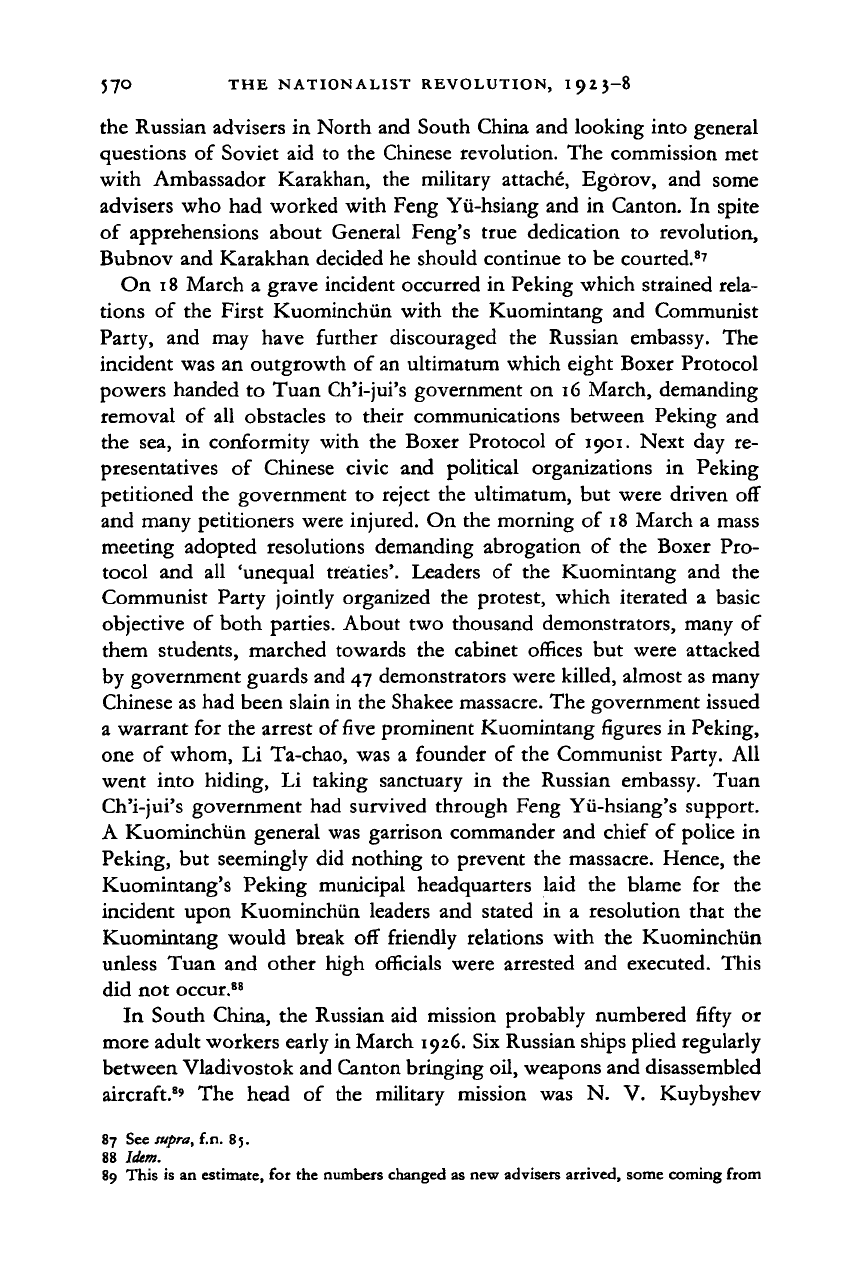
570 THE NATIONALIST REVOLUTION, 1923-8
the Russian advisers
in
North and South China
and
looking into general
questions
of
Soviet
aid to the
Chinese revolution.
The
commission
met
with Ambassador Karakhan,
the
military attache, Egorov,
and
some
advisers
who had
worked with Feng Yii-hsiang
and in
Canton.
In
spite
of apprehensions about General Feng's true dedication
to
revolution,
Bubnov
and
Karakhan decided
he
should continue
to be
courted.
87
On
18
March
a
grave incident occurred
in
Peking which strained rela-
tions
of the
First Kuominchun with
the
Kuomintang
and
Communist
Party,
and may
have further discouraged
the
Russian embassy.
The
incident was
an
outgrowth
of
an ultimatum which eight Boxer Protocol
powers handed
to
Tuan Ch'i-jui's government
on 16
March, demanding
removal
of all
obstacles
to
their communications between Peking
and
the
sea, in
conformity with
the
Boxer Protocol
of
1901. Next
day re-
presentatives
of
Chinese civic
and
political organizations
in
Peking
petitioned
the
government
to
reject
the
ultimatum,
but
were driven
off
and many petitioners were injured.
On the
morning
of
18 March
a
mass
meeting adopted resolutions demanding abrogation
of the
Boxer
Pro-
tocol
and all
'unequal treaties'. Leaders
of the
Kuomintang
and the
Communist Party jointly organized
the
protest, which iterated
a
basic
objective
of
both parties. About
two
thousand demonstrators, many
of
them students, marched towards
the
cabinet offices
but
were attacked
by government guards and 47 demonstrators were killed, almost as many
Chinese
as
had been slain in the Shakee massacre. The government issued
a warrant
for
the arrest
of
five prominent Kuomintang figures
in
Peking,
one
of
whom,
Li
Ta-chao,
was a
founder
of
the Communist Party.
All
went into hiding,
Li
taking sanctuary
in the
Russian embassy. Tuan
Ch'i-jui's government
had
survived through Feng Yii-hsiang's support.
A Kuominchun general
was
garrison commander
and
chief
of
police
in
Peking,
but
seemingly
did
nothing
to
prevent
the
massacre. Hence,
the
Kuomintang's Peking municipal headquarters laid
the
blame
for the
incident upon Kuominchun leaders
and
stated
in a
resolution that
the
Kuomintang would break
off
friendly relations with
the
Kuominchun
unless Tuan
and
other high officials were arrested
and
executed. This
did
not
occur.
88
In South China,
the
Russian
aid
mission probably numbered fifty
or
more adult workers early in March 1926. Six Russian ships plied regularly
between Vladivostok and Canton bringing oil, weapons and disassembled
aircraft.
8
"
The
head
of the
military mission
was N. V.
Kuybyshev
87 See supra,
f.n. 85.
88 Idem.
89 This
is an
estimate,
for the
numbers changed
as
new advisers arrived, some coming from
Cambridge Histories Online © Cambridge University Press, 2008
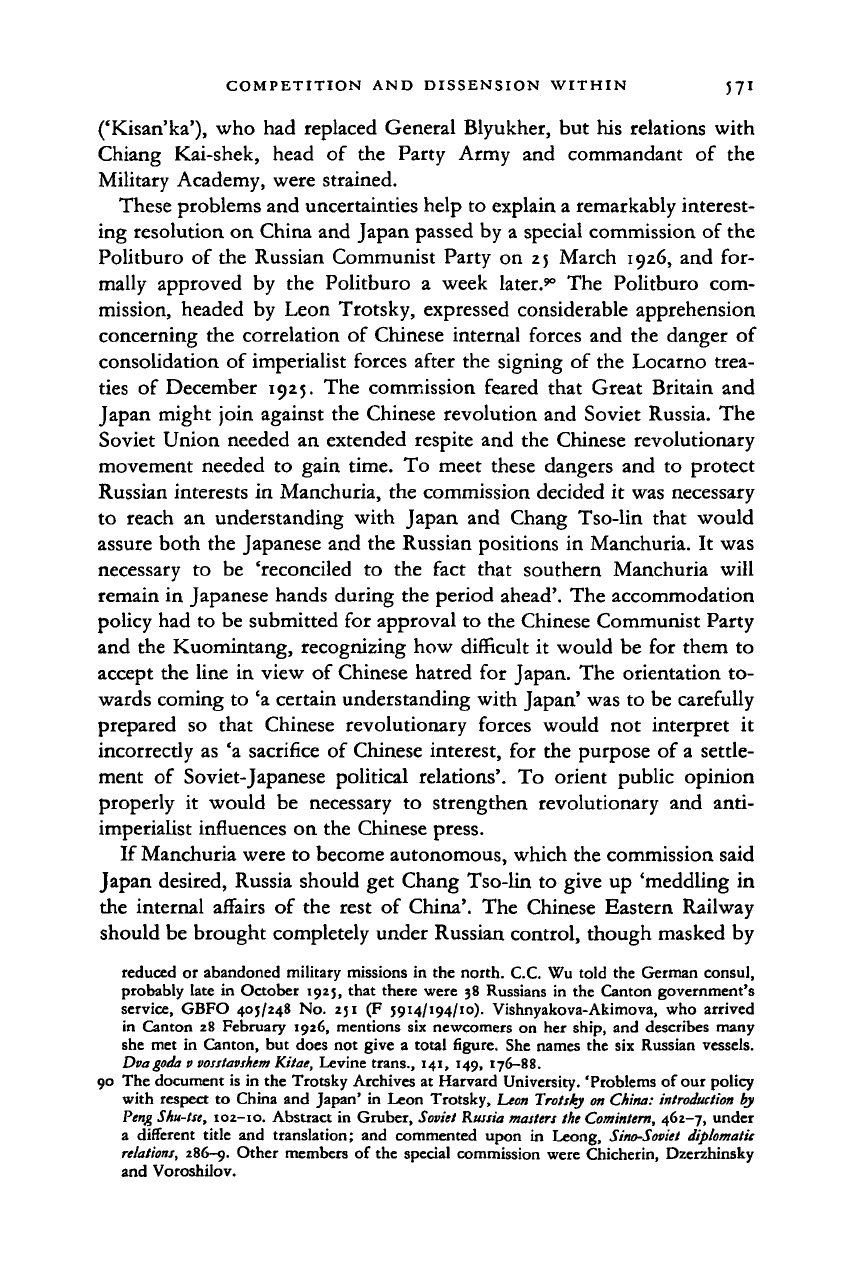
COMPETITION AND DISSENSION WITHIN 571
('Kisan'ka'), who had replaced General Blyukher, but his relations with
Chiang Kai-shek, head of the Party Army and commandant of the
Military Academy, were strained.
These problems and uncertainties help to explain a remarkably interest-
ing resolution on China and Japan passed by a special commission of the
Politburo of the Russian Communist Party on 25 March 1926, and for-
mally approved by the Politburo a week later.
90
The Politburo com-
mission, headed by Leon Trotsky, expressed considerable apprehension
concerning the correlation of Chinese internal forces and the danger of
consolidation of imperialist forces after the signing of the Locarno trea-
ties of December 1925. The commission feared that Great Britain and
Japan might join against the Chinese revolution and Soviet Russia. The
Soviet Union needed an extended respite and the Chinese revolutionary
movement needed to gain time. To meet these dangers and to protect
Russian interests in Manchuria, the commission decided it was necessary
to reach an understanding with Japan and Chang Tso-lin that would
assure both the Japanese and the Russian positions in Manchuria. It was
necessary to be 'reconciled to the fact that southern Manchuria will
remain in Japanese hands during the period ahead'. The accommodation
policy had to be submitted for approval to the Chinese Communist Party
and the Kuomintang, recognizing how difficult it would be for them to
accept the line in view of Chinese hatred for Japan. The orientation to-
wards coming to 'a certain understanding with Japan' was to be carefully
prepared so that Chinese revolutionary forces would not interpret it
incorrectly as 'a sacrifice of Chinese interest, for the purpose of a settle-
ment of Soviet-Japanese political relations'. To orient public opinion
properly it would be necessary to strengthen revolutionary and anti-
imperialist influences on the Chinese press.
If Manchuria were to become autonomous, which the commission said
Japan desired, Russia should get Chang Tso-lin to give up 'meddling in
the internal affairs of the rest of China'. The Chinese Eastern Railway
should be brought completely under Russian control, though masked by
reduced or abandoned military missions in the north. C.C. Wu told the German consul,
probably late in October 1925, that there were 38 Russians in the Canton government's
service, GBFO 405/248 No. 251 (F 5914/194/10). Vishnyakova-Akimova, who arrived
in Canton 28 February 1926, mentions six newcomers on her ship, and describes many
she met in Canton, but does not give a total figure. She names the six Russian vessels.
Dvagoda v
vosstavshem
Kitae, Levine trans., 141, 149, 176-88.
90 The document is in the Trotsky Archives at Harvard University. 'Problems of our policy
with respect to China and Japan' in Leon Trotsky, Leon Trotsky on China:
introduction
by
Peng
Shu-tse,
102-10. Abstract in Gruber, Soviet Russia masters the
Comintern,
462-7, under
a different title and translation; and commented upon in Leong, Sino-Soviet diplomatic
relations, 286-9. Other members of the special commission were Chicherin, Dzerzhinsky
and Voroshilov.
Cambridge Histories Online © Cambridge University Press, 2008
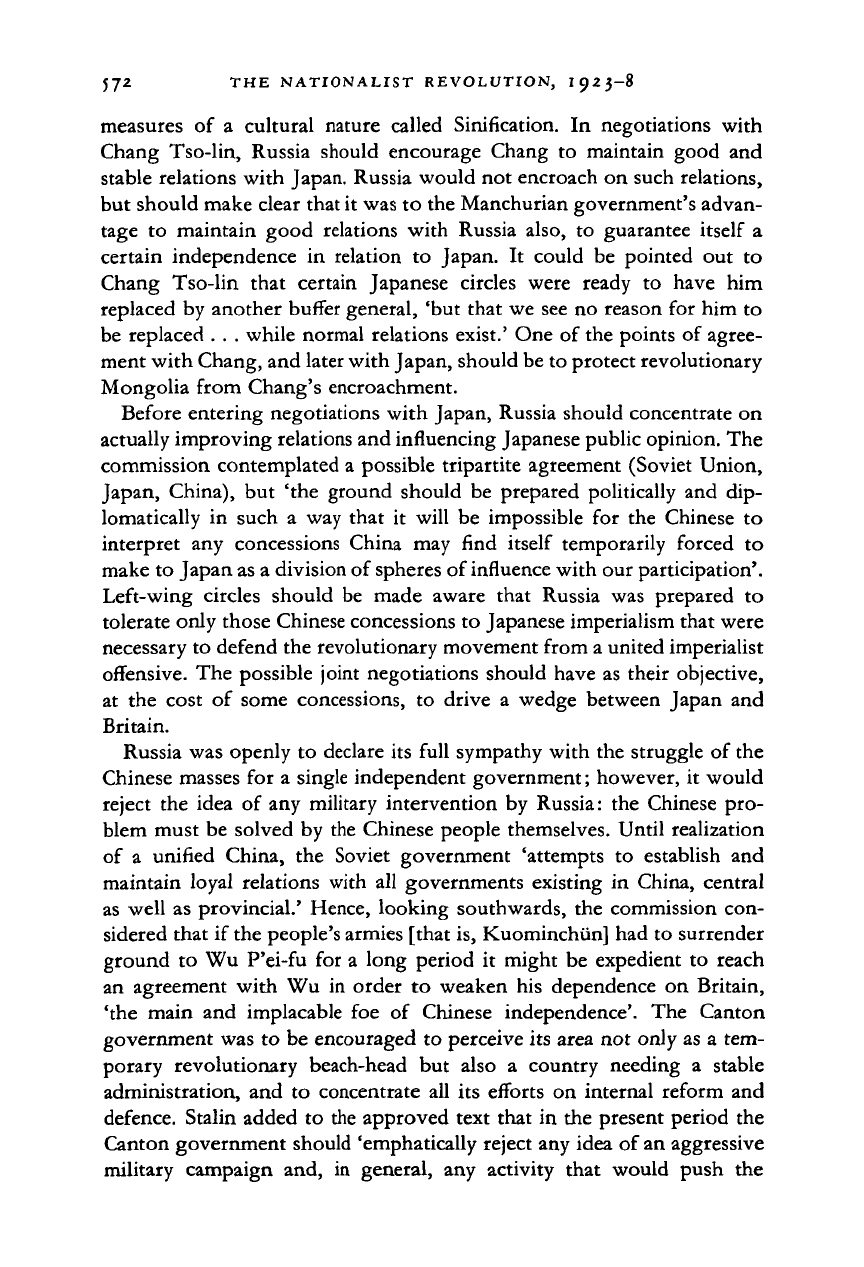
572 THE NATIONALIST REVOLUTION, I 9 2 3-8
measures of a cultural nature called Sinification. In negotiations with
Chang Tso-lin, Russia should encourage Chang to maintain good and
stable relations with Japan. Russia would not encroach on such relations,
but should make clear that it was to the Manchurian government's advan-
tage to maintain good relations with Russia also, to guarantee itself a
certain independence in relation to Japan. It could be pointed out to
Chang Tso-lin that certain Japanese circles were ready to have him
replaced by another buffer general, 'but that we see no reason for him to
be replaced . . . while normal relations exist.' One of the points of agree-
ment with Chang, and later with Japan, should be to protect revolutionary
Mongolia from Chang's encroachment.
Before entering negotiations with Japan, Russia should concentrate on
actually improving relations and influencing Japanese public opinion. The
commission contemplated a possible tripartite agreement (Soviet Union,
Japan, China), but 'the ground should be prepared politically and dip-
lomatically in such a way that it will be impossible for the Chinese to
interpret any concessions China may find itself temporarily forced to
make to Japan as a division of spheres of influence with our participation'.
Left-wing circles should be made aware that Russia was prepared to
tolerate only those Chinese concessions to Japanese imperialism that were
necessary to defend the revolutionary movement from a united imperialist
offensive. The possible joint negotiations should have as their objective,
at the cost of some concessions, to drive a wedge between Japan and
Britain.
Russia was openly to declare its full sympathy with the struggle of the
Chinese masses for a single independent government; however, it would
reject the idea of any military intervention by Russia: the Chinese pro-
blem must be solved by the Chinese people themselves. Until realization
of a unified China, the Soviet government 'attempts to establish and
maintain loyal relations with all governments existing in China, central
as well as provincial.' Hence, looking southwards, the commission con-
sidered that if the people's armies [that is, Kuominchiin] had to surrender
ground to Wu P'ei-fu for a long period it might be expedient to reach
an agreement with Wu in order to weaken his dependence on Britain,
'the main and implacable foe of Chinese independence'. The Canton
government was to be encouraged to perceive its area not only as a tem-
porary revolutionary beach-head but also a country needing a stable
administration, and to concentrate all its efforts on internal reform and
defence. Stalin added to the approved text that in the present period the
Canton government should 'emphatically reject any idea of an aggressive
military campaign and, in general, any activity that would push the
Cambridge Histories Online © Cambridge University Press, 2008
